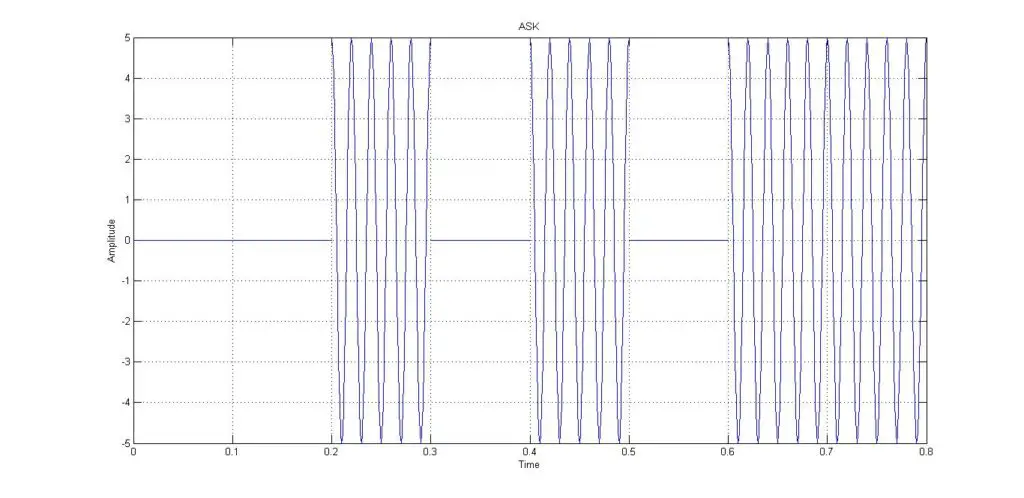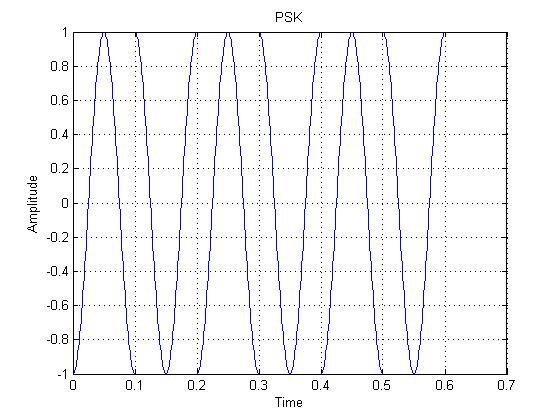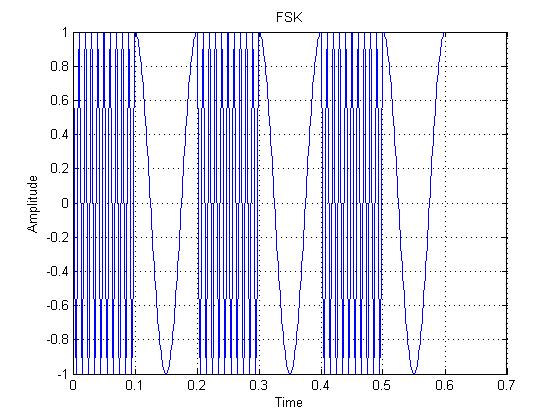what is amplitude, frequency & phase shift keying modulations ?
Amplitude shift keying (ASK modulation)
Amplitude shift keying is a modulation technique in digital communication. It is a form of amplitude modulation that represents the digital data in discrete amplitude levels.
For a binary data, there are two levels 1s and 0s. In ASK modulation for binary symbol 1, a fixed-amplitude carrier wave is transmitted with constant frequency and phase. And the for symbol 0 no signal will be transmitted.
An ASK system is similar to an ON and OFF switching of sinusoidal transmission for the state of 1 and 0 respectively.
ASK output waveform

Amplitude shift keying MATLAB code
clear all close all clc g=[0 0 1 0 1 0 1 1]; f=50; n=1; while n <= length (g) if g(n) == 0 t1 = (n-1) * 0.1:0.1/100:n*0.1 s1 = (0)*cos(2 *pi*f*t1) plot(t1,s1) grid on hold on else t =(n-1)*0.1:0.1/100:n*0.1; s=(5)*cos(2*pi*f*t); plot(t,s); grid on; hold on; end n=n+1; end title('ASK') xlabel('Time') ylabel('Amplitude')
Phase shift keying (PSK modulation)
Phase shift keying (PSK) is a digital communication method in which the phase of a transmitted signal is varied to represent digital states.
For the binary form of PSK called binary phase-shift keying (BPSK), uses signal phase difference of 0 and 180 degrees to represent the two binary states.
PSK output waveform

Phase shift keying MATLAB code
clear all close all clc g=[1 0 1 0 1 0 ]; f=10; n=1; while n <= length (g) t = (n-1) * 0.1:0.1/100:n*0.1; if g(n) == 0 p = cos(2 *pi*f*t+0); plot(t,p); grid on; hold on; else p1=cos(2*pi*f*t+(pi)); plot(t,p1); grid on; hold on; end n=n+1; end title('PSK') xlabel('Time') ylabel('Amplitude')
Frequency shift keying (FSK modulation)
Frequency shift keying (FSK) is a frequency modulation technique in digital communication. FSK transmits through discrete frequency changes of a carrier signal at a constant amplitude and phase.
In Binary frequency shift keying (BFSK), the two binary symbols 0 and 1, are each represented by using a specific frequency for logic 0 and another frequency value for logic 1. Mostly a lower frequency (space frequency) representative for state 0 and a higher frequency (mark frequency) for state 1.
FSK output waveform
 Frequency shift keying MATLAB code
Frequency shift keying MATLAB code
clear all close all clc g=[1 0 1 0 1 0]; f=10; n=1; while n <= length (g) t = (n-1) * 0.1:0.001:n*0.1; if g(n) == 0 p = cos(2 *pi*f*t); plot(t,p); grid on; hold on; else p1=cos(2*pi*f*10*t); plot(t,p1); grid on; hold on; end n=n+1; end title('FSK') xlabel('Time') ylabel('Amplitude')
